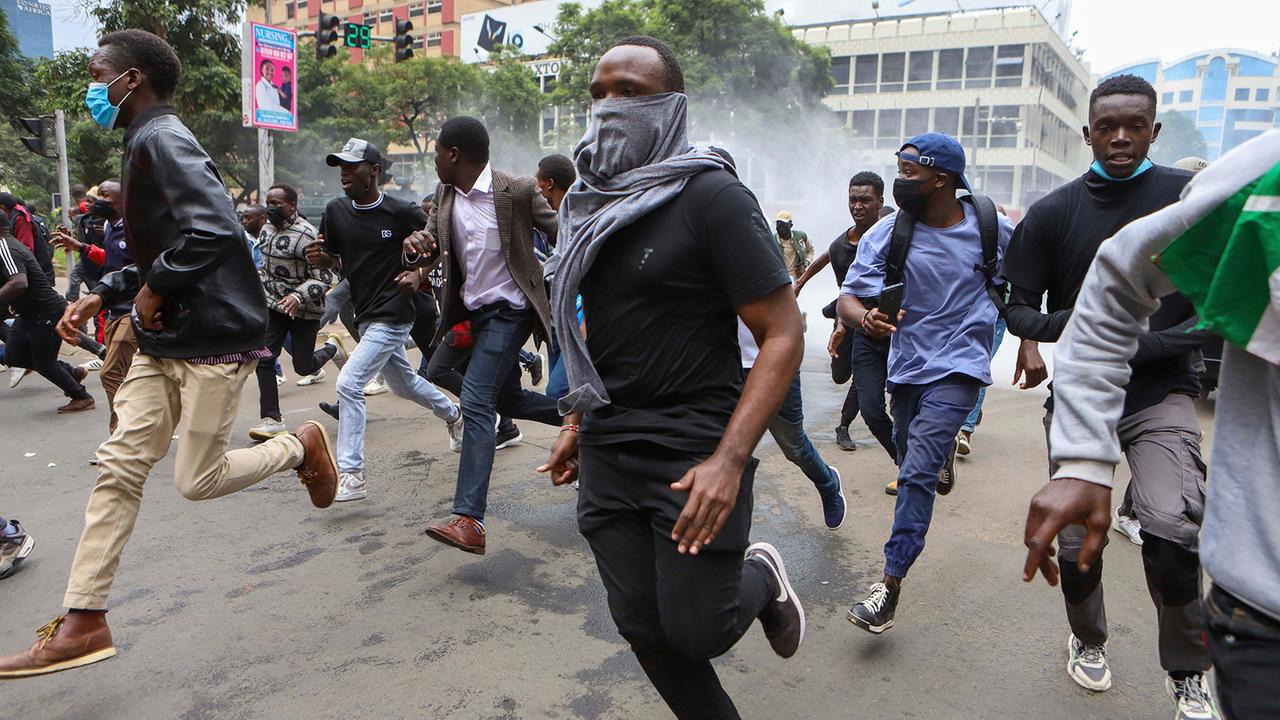These are turbulent days in Kenya: young adults are taking to the streets all over the country to protest against President Ruto and his economic policies. There have already been initial successes. But the protests continue.
“Ruto must go,” shout the mostly young demonstrators in downtown Nairobi. The president, elected in 2022, is particularly unpopular among young Kenyans.
Hardly anyone at the demonstrations is over 30 years old; the majority are female, because women feel particularly taken aback by the tax plans of Kenyan President William Ruto.
Demonstrator Ashley Natasha explains: “I came here because the government wants to increase taxes on sanitary pads, even though many people can't afford them now.” The 24-year-old says she is here in solidarity with all women and children.
Higher taxes on foreign products
Previously, Kenya's government had announced that it would impose higher taxes on products imported from abroad. Even basic foodstuffs such as bread, milk and flour could now be subject to VAT. In addition, there will be an increase in income tax and more social security contributions. Overall, the government is hoping for around 2.5 billion euros in additional revenue.
About 80 percent of Kenyans are 35 years old or younger, many of whom are taking part in the protests. Generation Z is demanding Ruto's resignation and the complete reversal of what they say are his destructive tax plans.
Young people in particular are protesting
For the first time in Kenya's history, it is primarily young people who are taking to the streets across the country. Even in the coastal metropolis of Mombasa and in the tourist areas, young people are taking to the streets.
They arranged to meet mainly via social media such as X, formerly Twitter, or Tiktok, explains another demonstrator, Ziporrah Akinyi: “Social media helps us to talk to everyone in Kenya and the world. So they can support us and of course that is very beneficial to us.”
Harsh police action
The smartphone generation is demonstrating against those who can only help themselves with tear gas. Although the protesters are peaceful – underpinned by their slogan “we are peaceful”, the police are taking tough action against them. They are repeatedly chased through the city; it is a game of cat and mouse with the police.
The police fire dozens of tear gas canisters at the crowd. Behind closed doors, a police officer says that the aim is to scare the demonstrators – by spraying water cannons with chemicals and tear gas, but also by making arrests. At least one demonstrator dies from gunfire, hundreds are injured and detained.
Demand for compensation for taxes
Just two years ago, Ruto was a symbol of change. He still enjoys a lot of international recognition, but he is coming under increasing pressure domestically. The youth rebellion is a sign that his support is noticeably dwindling.
The new taxes have even angered many of Ruto's former voters. The high inflation in the East African country has caused the already small middle class to shrink even further. Many people in Kenya still live in poverty. Despite this, Ruto travels to the USA on an expensive private jet for state visits, invites an ultra-conservative priest to pray in Kenya at state expense, or shows up at meetings wearing a 60,000 euro watch.
This is absurd, says protester Akinyi: “We feel that the government is not listening to us. We elected them to work for our needs, but now they are oppressing us.” Many also criticize the high level of corruption in Kenya, and want more transparency. Paying taxes is fine in principle, but there must be something in return. A demonstrator holds up a sign: “Why pay taxes in the Samburu region? We have only had 45 kilometers of tarred roads since independence.”
The demonstrations are also having an impact on the government, as it is taking a step towards the citizens. There will be no new taxes on bread and cooking oil for the time being. And yet Kenya's youth want to continue. They want to bring the whole country to a standstill with a week of angry protests. There will then be actions everywhere, in discos, churches and mosques.
Thilko Gläßgen, ARD Nairobi, tagesschau, 24.06.2024 13:51




